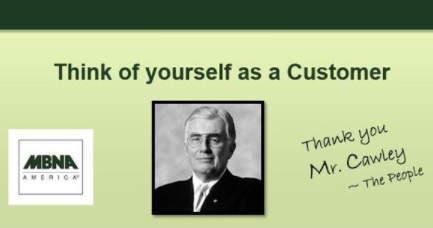At 14, I began working for MBNA, a credit card bank in my hometown of Newark, now a part of Bank of America. MBNA had a customer-first culture. “Think of yourself as the Customer” was inscribed in the carpets and elevators around every building. Every month the entire company was measured against a set of key indicators- one of those indicators was 2-ring pickup. The goal was that over 99% of all calls were to be picked up in 2 rings or less. We didn’t want to keep our customers waiting. Memories were imprinted at an early age as I watched people dive across desks to answer a telephone on the second ring to ensure we hit that metric. Customer success was part of the culture, and for me, it engendered a tremendous amount of pride in the company.

Over the next 20+ years, I worked for a number of companies. Several of which I started, but still, I never experienced this level of customer service. Many were good or even great companies, but customer success wasn’t a focus like it was for MBNA. The companies cared about their customers, it just wasn’t part of the culture. Amazon’s Jeff Bezos installed a customer-first culture by leaving an empty chair.
When we started Pendo, I insisted that we create a customer-first culture. I wanted to feel like I did when I began my career. I wanted to have a business that was known for taking care of its customers.
Having a focus on customers sounds easier than it is. It requires hard trade-offs. I started working the support queue myself. When we received questions or problems, we responded quickly regardless of the time. We sometimes adjusted our product plans quickly based on customer issues. We continued this and installed this attentiveness into our team.
What happens when a customer needs an extra set of hands to get started? We create a services team.
What if the customer changes something that causes us work? Do we do it or tell them “sorry you shouldn’t have done that”? No customer or product is perfect- we find a way to help. There are a million excuses that can be made to not help a customer. So instead of allowing ourselves or team to make them, we simply instill the value in each account.
Of course, there can be negative aspects associated with this level of customer service. The dark side of having a maniacal focus on the customer, is that we risk overreacting or building custom solutions. Building one-off solutions for a single customer means they are on a limb. In actuality, building one-off customer solutions is not customer focused. It’s ultimately not what’s best for all customers. Most of the time, simply having in-depth conversations with our users allows our team to discover the best methods to resolve issues.
But at the end of the day, steering a company is like steering a large ship. You can turn the wheel but it takes a while for the ship to entirely move in the desired direction. Jumping around to support the need of the latest “loud” customer will prevent the ship from reaching its destination and needs to be guarded.
The key to balancing overreaction and responsiveness is transparent communication. Explaining to customers why. Why we did something one way, why we didn’t do something, and why we may have built something else.

Proud
If I had to pick one value that has most contributed to our success, it would be our maniacal focus on the customer. It has helped us raise capital, hit our growth goals, and has lifted us to this point. Our customer-focused culture is a differentiator, and I am extremely proud of our organization.
I think every startup wants to leave the world a better place because of it. Not all of us get to cure disease or feed the less fortunate. By focusing on customer outcomes, I feel like we have an opportunity to leave the world a better place, and this is tremendously rewarding.
